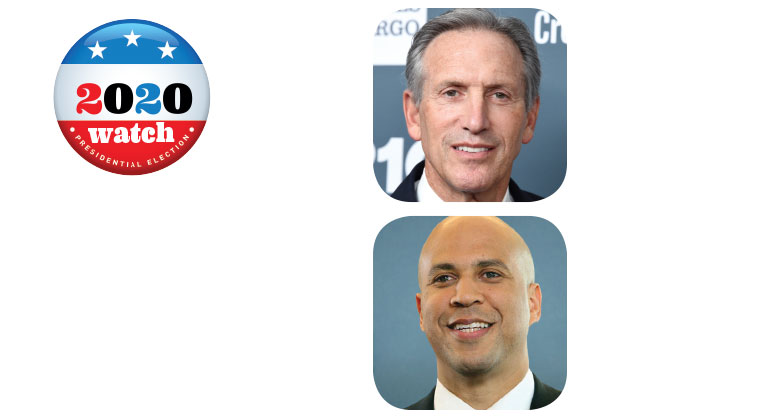Presidential Hopefuls Howard Schultz and Cory Booker


Howard “Starbucks” Schultz has been waiting half a year for this moment. In June 2018, he resigned as CEO of the global coffee company, assembled a cadre of advisors, and began formulating strategy to win the White House in 2020. He followed the standard Washington playbook to build momentum: He wrote a book, and coordinated all the hubbub around its release to coincide with his appearance on the CBS show 60 Minutes, where he announced that he is “seriously considering running for president, as a centrist independent.”
Schultz doesn’t seem to have anticipated being bombarded, three days later, with aggressive Washington Post coverage (columnist Eugene Robinson titled his piece “This Is No Time for Howard Schultz’s Foolishness”). He clearly has rattled the Democratic Party’s left wing: He was heckled at a book event by someone shouting, “Don’t help elect Trump,” and liberal talk show hosts made him the butt of jokes.
Trump himself seemed to relish the prospect, tweeting in response, “Howard Schultz doesn’t have the guts to run for president!” adding, “I only hope that Starbucks is still paying me their rent in Trump Tower.”
The political calculus for both sides is simple: No independent candidate has won the election during the postwar era, and the fear among Democrats is that Schultz will split the anti-Trump vote.
“If you want to run, you have to choose a side,” a senior House Democrat told me this week. “Independent voters are the ones who decide the elections in America, and Schultz’s candidacy means that Trump will be reelected. It’s enough for him to receive 3% support in the swing states to block the Democratic candidate.”
Josh Kraushaar, political editor of the National Journal, thinks people shouldn’t be so quick to write Schultz off.
“Make no mistake — he does have a lot of obstacles, and it’s not like he’d be a front runner. But I think he should be taken seriously. I think if there’s any moment in our recent political history for a centrist independent, it’s an election that features President Donald Trump and Elizabeth Warren or somebody like her.”
How Schultz’s Jewish background will factor in the race is not yet clear. He has expressed support for Israel, and opened Starbucks branches there. This will be the first Jewish candidate with serious economic wherewithal to get into the race — although if last week’s trend continues, we’ll have to wait a while for the first Jewish president.
Another name familiar to Jewish voters is Senator Cory Booker of New Jersey, the former mayor of Newark. Booker, 49, has served in the Senate since 2013, focusing mainly on social issues, such as racial-based discrimination, law-enforcement reforms, affordable housing, and the health system. He garnered support from the Jewish community in his Senate run, but his vote in favor of Obama’s Iran deal largely scuttled that.
Booker joins an already crowded Democratic playing field. The progressive niche is already occupied by the likes of senators Kamala Harris, Elizabeth Warren, and Kirsten Gilibrand. But Booker isn’t one to give up so easily. His first run for Newark mayor in 2002 ended in a loss, but he ran again four years later — and won. Even if his candidacy fails this time around, it could serve as an opening shot in the 2024 campaign.
(Originally featured in Mishpacha, Issue 747)
Oops! We could not locate your form.













